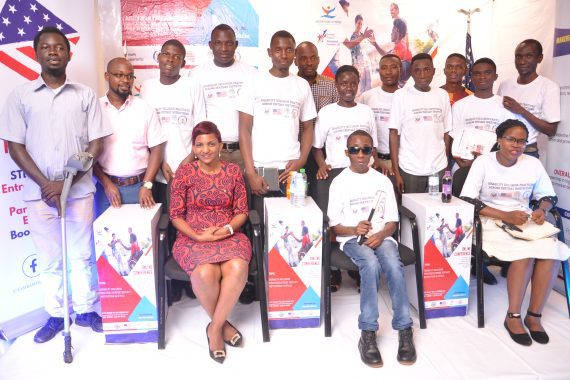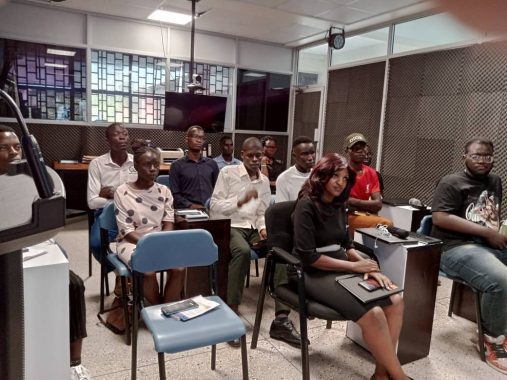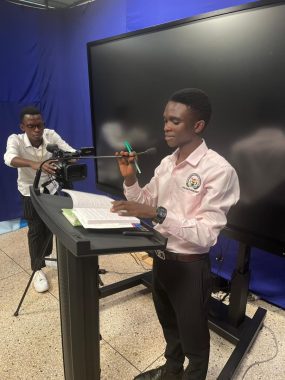International Students with Disabilities Exchange Program (Makerere University, Uganda)
Third Place Prize Winner, 2023 MacJannet Prize
International Students with Disabilities Exchange Program is the third place winner of the 2023 MacJannet Prize. The program is based at the Disability Resource and Learning Center (DRLC), a Makerere University Business School outreach center that provides leadership for creating a proactive culture of disability awareness, facilitating the removal of barriers and creation of accessible and inclusive environments for students and staff with disabilities. This improves on the implementation of the UN Convention on the Rights of Persons with Disabilities (UNCRPD) and the Sustainable Development Goals (SDGs). The DRLC also offers consultation on a broad range of disability issues and carries out research on disability issues, employability and entrepreneurship among others and is a one stop point for disability information in Uganda.

One of the best strategies that has been used to build divergent capacities for students has been the aspect of networking. This takes shape from sharing unique experiences that are meant to empower different abilities that reside within these students or those that have not been explored. This originates from a school of thought that “everyone is blessed uniquely to pursue different goals in life.” Various student exchanges have been organized across universities which have allowed students to share aspirations and have acted as a motivational tool. The program is able to track a number of success stories along this path. However, in all these engagements, one critical group of people has been disregarded in such efforts and yet they need them more than anyone else. The International Students with Disabilities Exchange Program provides critical attention to the students that have been marginalized because of physical, mental, and auditory limitations. The MUBS Disability Resource and Learning Centre wishes to change the narrative from dismay to a ray of hope to empower students to achieve their dreams. This can be achieved through organizing exchanges that are tailored to tell the unique story of Disability across borders.
“Winning this award serves as a reminder that perseverance and passion can lead to extraordinary achievements. We hope to continue pushing boundaries beyond borders and making a positive impact through cultural exchange and knowledge sharing.” – Gorretti Byomire, Director, Disability Resource and Learning Centre

The program organized a Convention of Students with Disabilities and their educators in higher education institutions in Africa, South Asia and the US. The online convention brought together 291 students and their educators from 27 countries in Africa, South Asia and the US. The project’s ultimate goal was to improve the personal leadership and development capacity of students with disabilities, resulting in their empowerment. Another project outcome was the formation of networks and collaborations between students with disabilities at African and American universities and colleges, resulting in increased meaningful engagements for people with disabilities. Peer-to-peer networks would increase social connectedness and give students with disabilities a sense of belonging.

The students were able to share their experiences and the learning challenges that they faced especially during and after of COVID-19. The participants came up with solutions and strategies on how to deal with them. The program facilitated dialogue and incredible collaborations for individuals who would have never met otherwise. The students committed themselves to becoming ambassadors who advocate for disability inclusion in their institutions. A telegraph group was formed to support continuous engagement. Many times, Universities and colleges have student exchange opportunities or study abroad opportunities but do not have opportunities for students with disabilities nor are students with disabilities considered for student exchanges, therefore they are left behind. This online convention is an opportunity to bring the benefits for student exchange opportunities closer to the students with disabilities.
The students with disabilities have benefited from positive peer influences from their fellow students with disabilities and gained increased social connectedness. There was increased ability of students to create networks and discuss pertinent issues affecting them and how-to solve them. They realized that the challenges facing students in the global North and similar to the challenges being faced by students in the global South. There was cultural exchange between African and American students with disabilities. The facilitators formed a post-convention telegram channel to foster continuous engagement and to strengthen collaborations between different educators across African and American universities. All attendees committed to becoming ambassadors to advocate for disability inclusion at their respective institutions of learning.